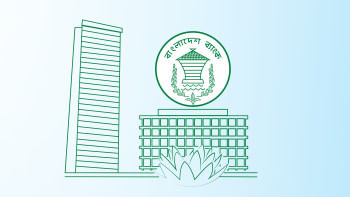Whose property is 'our' gas reserve?
ABOUT a decade ago, a group of researchers was observing a primary school classroom in the US. The second graders were talking about Lake Michigan and water pollution in and around it. One of them innocently enquired: "Who owns the water?"
The first probable owner was thought to be George Bush because he was the then president of the US. Bill Gates is well known for computer engineering and his riches, so the kids speculated that he owned the water! Perhaps, the second grade kids also knew of the many discretionary powers that the police usually apply, so that was their third choice.
Now, let us come to our gas reserve and its ownership. Some welfare-oriented organisations recently protested against any Production Sharing Contract (PSC) of our offshore gas reserve in the Bay of Bengal, and a university professor, Dr. Anu Mohammad, was injured in police action. Many condemned this police excess and The Daily Star columnist Mr. Syed Badrul Ahsan (in his column of September 9) asked another basic question which is: "Who owns the state?"
His point is that such incidents signify that the state has been lost to somebody else, and we need to "reclaim" this independent state that was achieved after much bloodshed.
The PSC on our offshore gas exploration says that only 20% of the available gas during the contract period of 25 years would be Bangladesh's property. The rest 80% would virtually be the property of the exploring companies, which they could sell to us or to others.
My question is, if our share is only 20% and the contracting international companies (ICs) get 80%, then does not it mean that the property is mainly theirs? One of the contracting ICs is said to be American. So, is our Bay of Bengal resource also owned, at least partially, by the US (like the water of Lake Michigan)? I realise that the quantum of investments in the offshore exploration is very high and the risk associated with these investments is extreme.
But this is only one side of the coin. The other side shows that the risk is not so much and the gas reserve in Bangladesh's part of the Bay of Bengal is estimated to be 15 trillion cubic feet (tcf). Myanmar's reserve is known to be 7 tcf, while India has discovered 100 tcf reserve!
So far as I understand, Anu Mohammad and his group's protest is based on the assumption that the major share of gas will go out of Bangladesh, which is not only energy-hungry but also experiencing short in gas supply. Their demand is that the PSC must be revised so that the full amount of gas can be used here in the country whatever the price might be.
My suggestion is to keep the gas for use in Bangladesh. The money spent to buy that is also important. If the Bay of Bengal gas reserve is the property of our country our share should logically be around 50%, whatever might be the cost and the risk of investment associated with the exploration. Otherwise, it would mean that the property actually belongs to the OICs, and we are just gatekeepers who will get a meager share of 20%. If I were one of the policy makers, I would never agree to a PSC that gives Bangladesh less than 40% share.
It is true that we badly need to explore just now to quench our thirst for energy, but we cannot leave the next generations hungrier in energy by giving away 80% of our own property. This is simply unacceptable. It is known that at present, we have huge amount of idle liquid money in banks, which we could invest if the project is proved profitable. And we can wait longer to develop technical expertise of our own if no IC comes to explore at s higher rate of share for us.

 For all latest news, follow The Daily Star's Google News channel.
For all latest news, follow The Daily Star's Google News channel. 



Comments